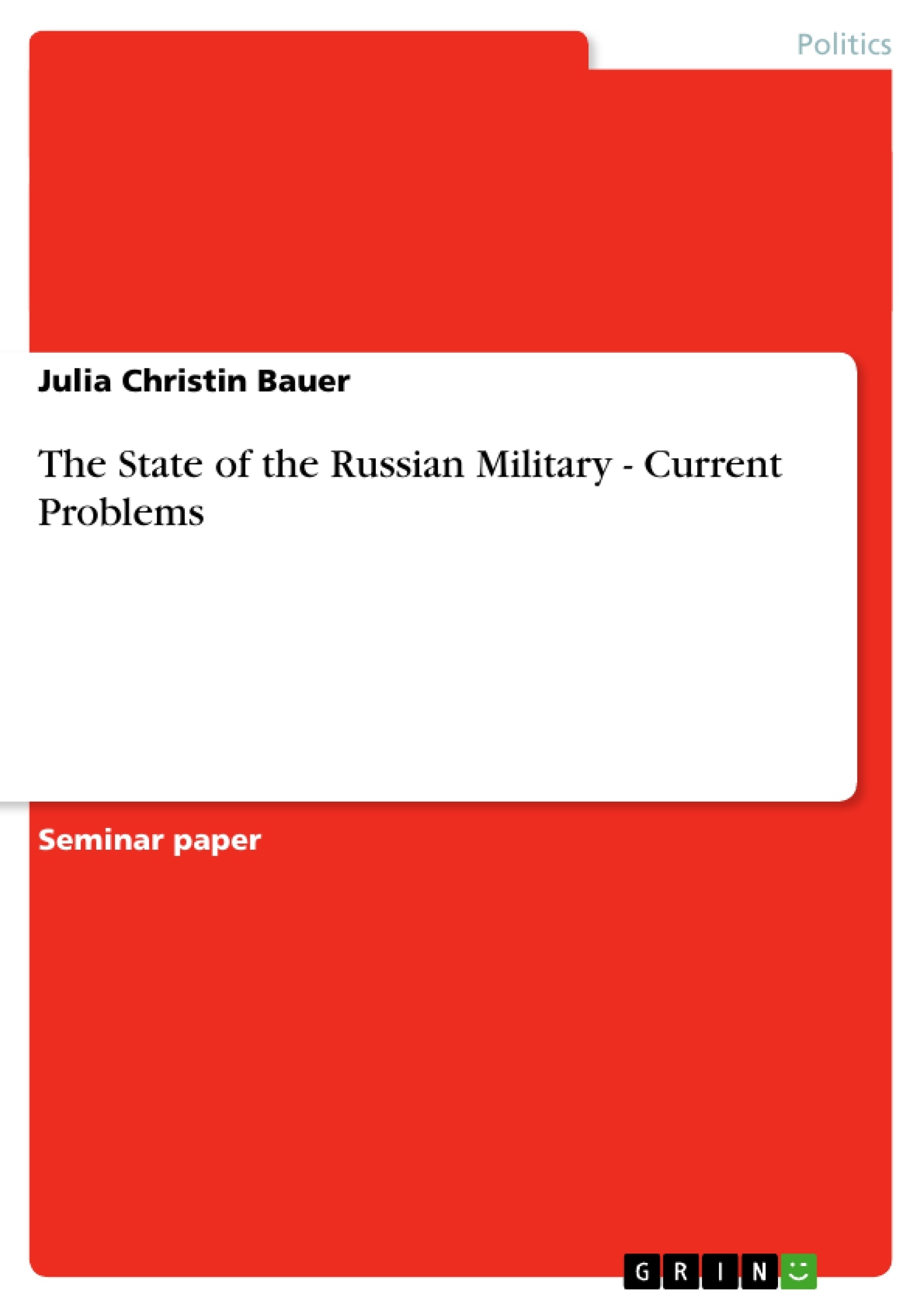The internal state of the army reveals that far-reaching and profound military reform cannot be achieved by pure arms build-up. It becomes clear that a new military strategy and a meaningful military reform plan are needed in order to improve its state. Sustainable change can only be achieved through numerous multi-facetted reforms that reach the military at its core. It is therefore advisable for these reform plans to not only come from the outside (namely the political administration) but additionally be co-developed within the army itself. Only in such way will it be possible to implement them fully and to minimize inefficiency, corruption, vagueness and violence, archaic structures of hierarchy and an attitude that reminds of vested rights.
Finally, it has to be mentioned that the picture painted in the course of this paper is a rather negative one as its purpose is to outline weaknesses. Of course, the debated flaws and deficits are problematic and need to be addressed. Nevertheless, experts are divided when it comes to the measurement of the strength of Russia’s military.
Inhaltsverzeichnis (Table of Contents)
- Introduction
- Problems and weaknesses
- Dedovschina
- The cases of Andrej Sytschow and Radik Habirov
- The curtailment of Dedovschina in the Russian army.
- The Union of the Committee of Soldiers' Mothers of Russia.
- Lack of financial resources.
- Obsolete military equipment.....
- Housing issues and the state of accommodations
- Corruption..........\li>
- Recruiting and retaining personnel.....
- Lack of civilian control over the army
- Lack of transparent information policies..........\li>
- The case of the submarine Kursk.
- Conclusion.......
Zielsetzung und Themenschwerpunkte (Objectives and Key Themes)
This seminar paper aims to analyze the current state of the Russian military and highlight its significant weaknesses. It focuses on the problematic situation of the Russian armed forces, without addressing potential future reform plans. Key themes explored in the paper include:- Dedovschina: The phenomenon of harassment and subjugation of junior recruits by senior soldiers.
- Lack of financial resources: Including obsolete military equipment, inadequate housing, and insufficient funds for modernization.
- Corruption: The widespread corruption within the Russian military system.
- Recruiting and retaining personnel: The challenges faced in attracting and retaining qualified personnel.
- Lack of civilian control: The absence of effective civilian oversight over the military.
Zusammenfassung der Kapitel (Chapter Summaries)
Introduction
This section highlights the historical changes in the Russian military's reputation, shifting from a highly regarded force to one facing numerous challenges. It emphasizes the need for new strategies and reform plans in the current state of the Russian military, despite its traditional significance in Russian politics and society.Problems and weaknesses
This chapter delves into the various structural, financial, policy, and control deficits plaguing the modern Russian military. The focus is on the multifaceted challenges facing the armed forces, emphasizing the need for comprehensive reform.Dedovschina
This section examines the phenomenon of Dedovschina, a serious issue within the Russian military characterized by the harassment and subjugation of junior recruits by senior soldiers. The text explores the historical context of Dedovschina, its emergence, and its impact on the overall structure and functioning of the military. It also analyzes the severe consequences of Dedovschina, including physical and psychological violence, torture, and even murder.Lack of financial resources
This section examines the critical issue of financial constraints within the Russian military. It explores the problems associated with obsolete military equipment, inadequate housing conditions, and the insufficient funds allocated for modernization. This chapter highlights the significant impact of financial limitations on the Russian armed forces' overall effectiveness and preparedness.Corruption
This section explores the pervasive issue of corruption within the Russian military. It examines the various forms of corruption, including bribery, embezzlement, and nepotism, and analyzes their detrimental effects on the military's integrity, efficiency, and morale.Recruiting and retaining personnel
This section examines the challenges associated with attracting and retaining qualified personnel within the Russian military. It discusses the factors contributing to recruitment and retention difficulties, such as low pay, harsh working conditions, and limited career opportunities. It also explores the implications of these issues on the overall strength and effectiveness of the Russian armed forces.Lack of civilian control
This section analyzes the crucial issue of civilian control over the Russian military. It examines the lack of effective civilian oversight and its implications for accountability, transparency, and the prevention of military abuses.Lack of transparent information policies
This section examines the lack of transparent information policies within the Russian military. It explores the consequences of opaque information practices, including the difficulty of holding the military accountable for its actions and the lack of public trust in the armed forces.Schlüsselwörter (Keywords)
The key terms and concepts explored in this seminar paper include Dedovschina, financial resources, corruption, recruiting and retaining personnel, lack of civilian control, and lack of transparent information policies. The paper examines the complex challenges faced by the Russian military, highlighting the need for significant reform in order to address these critical issues.Frequently Asked Questions
What is Dedovschina in the Russian military?
Dedovschina is a systemic practice of harassment and physical abuse where senior soldiers subjugate junior recruits, often leading to severe violence or even death.
What are the main financial problems of the Russian army?
The military suffers from obsolete equipment, inadequate housing for personnel, and a general lack of funds for modernization and high-tech arms build-up.
How does corruption affect the Russian military?
Widespread corruption, including bribery and embezzlement, undermines efficiency, morale, and the successful implementation of reform plans.
Why is there a lack of civilian control over the army?
The Russian military lacks transparent information policies and effective oversight from political administrations, allowing archaic and inefficient structures to persist.
Who are the 'Soldiers' Mothers of Russia'?
It is a prominent organization that advocates for the rights of soldiers, exposes abuses like Dedovschina, and pushes for military reform from a civilian perspective.
- Arbeit zitieren
- BA Julia Christin Bauer (Autor:in), 2008, The State of the Russian Military - Current Problems, München, GRIN Verlag, https://www.grin.com/document/132613



